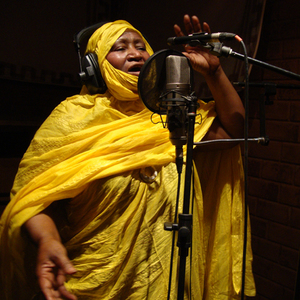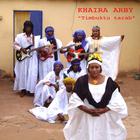Khaira Arby

- Genres:
- International, Jazz, New Age
- Meta styles:
- African Traditions, Ethnic Fusion, Latin Jazz/World Fusion, Worldbeat
- Styles:
- African Folk, Desert Blues, West African, World Fusion
Khaïra Arby (sometimes spelled Haira) "The Nightingale of the North" is a singer from Mali. She is from the desert- from Agouni, north of Timbuktu, Mali, and cousin to Ali Farka Touré. She sings in Sonrai, Arabic, Tamashek, accompanied by instruments and rhythms just as varied, with electric guitar and trickling beats, calabash, traditional violin and guitar, and drumming that creates that abrupt squared sound of the music from that part of Mali.
She was born on September 21, 1959, in the Abaradjou neighborhood of Tomboctou, to a Berabiche father and a Tamachek mother. The only singer in her family, Khaira started to perform, in 1970, when she was only eleven years old. She made her public debut with a cultural group from Abaradjou, and made such an impression that she was soon recruited by the ?troupe du cercle de Tomboctou'. And later that same year, she was promoted to soloist with ?troupe regionale de Gao', the ensemble with which she appeared at the 1970 biennale; a biannual music festival/competition featuring the best traditional and modern ensembles from throughout Mali.
In 1972, Khaira was recruited by the ?Orchestre de Tomboctou', a modern dance-band, and two years later, in 1974, was selected to represent Gao in Bamako, for the final round of the biennale. Khaira was awarded the third prize for best vocal soloist. Her blossoming music career was cut short, however, in 1976, when her father, frustrated that Khaira had abandoned her studies for music, forbid her from performing in public. Khaira obeyed, quit the ?Orchestre de Tomboctou', stopped performing, and got married.
Seven years later, after her divorce in 1983, Khaira started to get pulled back into music. After leaving her husband, she moved back to Abaradjou, where she was soon asked to manage a neighborhood cultural group. Khaira organized the ensemble and spent several months working, in particular, with a talented young female singer. On the evening of the group's debut performance, an unexpected turn of events pushed Khaira back in front of the public. Several hours before the group was to take the stage, her young prot?g? told her that her father would not let her sing in front of an audience. Faced with no other choice, Khaira was forced to take the stage; this fateful concert kicked off the second leg of Khaira's career.
In 1990, after working for a time in Bamako with Harouna Barry and the ?Orchestre Badema Nationale', Khaira released her first cassette ?Moulaye'. Three years later, she released ?Hala', recorded with her own group, and then in 2002, released her masterpiece ?Ya Rassoul'. Khaira, who still lives in Tomboctou, has been very busy over the last few months. In early February, she was invited to Bamako's Studio Bogolan to record three tracks with the American group ?Sway Machinery', and later in the month was back in the same studio, this time with her own group from Tomboctou, laying down the tracks for her upcoming international debut. And, according to her producer, Khaira's North American fans can look forward to the ?Nightingale of Tomboctou' making her US debut sometime in the fall of 2010.
Like Kha?ra herself, her music travels on an audio journey the essence of Mali - a meeting of compass points, religion, culture, the past and present. She sings about marriage, love, peace, the lives of the people from the region she comes from, development and democracy. The tracks on the 'Ya Rassoul' album are lovely and long - some over 6 minutes. There is 'Amandiath' which showcases that unique round sound of the traditional guitar. The production is so good you can hear the player's fingers tugging the strings, accompanied by the harsh haunting sound of the violin. Then the funky electric sound of 'Ehe Youma' with its intricate guitar moves, the soft slow bass guitar and all the while the call and response of the vocals, with the 'response' of the chorus just managing to hold down Kha?ra's soaring 'call'. The language is new too - soft rounded vowels, rolling r's, guttural sounds - words like 'biobini' pronounced 'bwaibini' , the curvaceous 'sourgou'. Timing is everything - the layering, pausing and meandering of the music and instruments that act as a backdrop and allow Kha?ra's voice to run free.
'Ya Rassoul' is produced by Samassa Records, Mali. As yet, it is not available internationally?
- Sort by

Timbuktu Tarab
- Year:
- 2010
- Tracks:
- 12
- Bitrate:
- 320 kbps